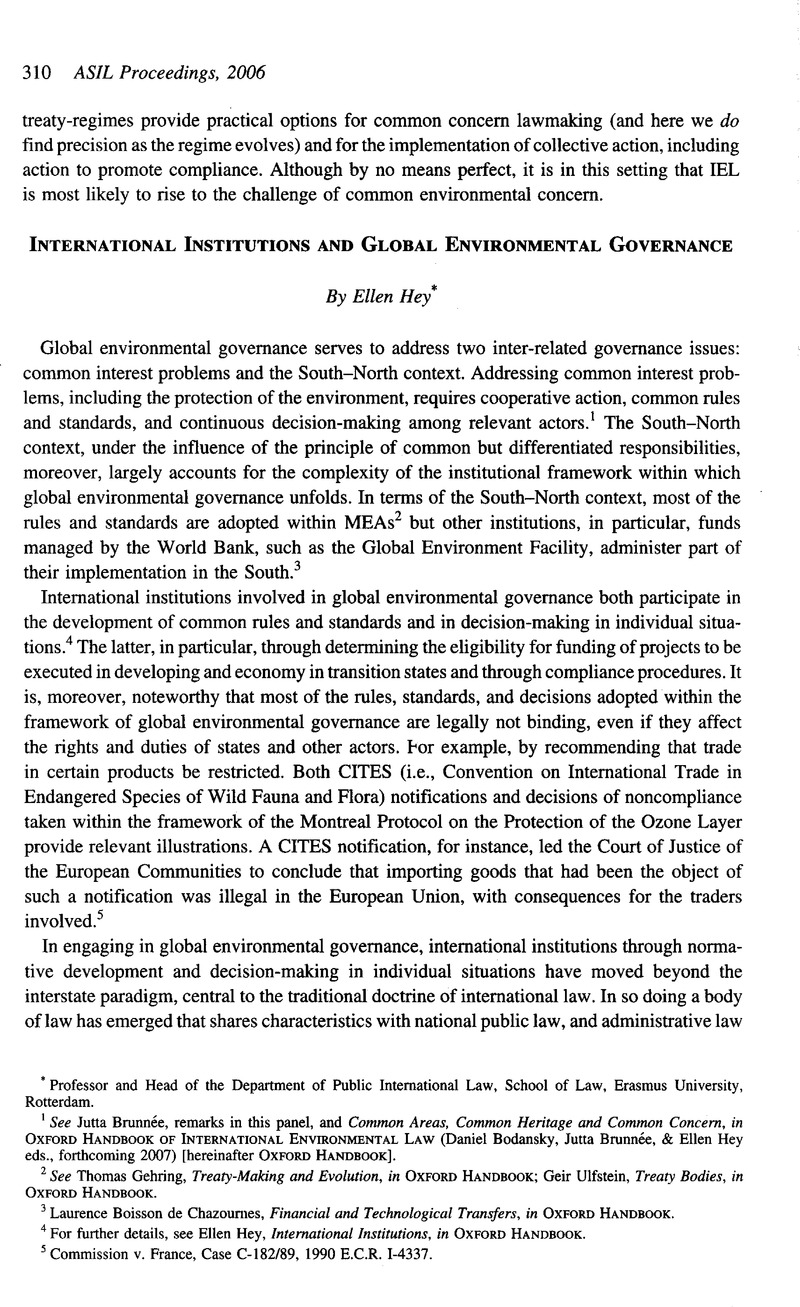No CrossRef data available.
Article contents
International Institutions and Global Environmental Governance
Published online by Cambridge University Press: 28 February 2017
Abstract

- Type
- International Environmental Law at the Beginning of the 21st Century
- Information
- Copyright
- Copyright © American Society of International Law 2006
References
1 See Brunnée, Jutta, remarks in this panel, and Common Areas, Common Heritage and Common Concern, in Oxford Handbook of International Environmental Law (Bodansky, Daniel, Brunnée, Jutta, & Hey, Ellen eds., forthcoming 2007)Google Scholar [hereinafter Oxford Handbook].
2 See Thomas Gehring, Treaty-Making and Evolution, in Oxford Handbook; Geir Ulfstein, Treaty Bodies, in Oxford Handbook.
3 Laurence Boisson de Chazournes, Financial and Technological Transfers, in Oxford Handbook.
4 For further details, see Ellen Hey, International|Institutions, in Oxford Handbook.
5 Commission v. France, Case C-182/89, 1990 E.C.R. 1-4337.
6 The term “public law” is here used in the broad sense as used in Dutch (publiekrecht) and German (öffentliches Recht) law, where it refers to constitutional and administrative law, two bodies of law which in Dutch and German law are conceptualized as intimately interrelated. For a broad conceptualization of “public law,” see Martin Loughlin, The Idea of Public Law (2003); see also Kingsbury, Benedict, Kirsch, Nico, & Stewart, Richard, The Emergence of Global Administrative Law, 68 Law & Contemp. Probs. 15 (2005)Google Scholar.
7 See Hersch Lauterpacht, Private Law Sources and Analogies of International Law (With Special Reference to Arbitration) (1927). See also Separate Opinion Judge ad hoc Lauterpacht, Application of the Convention on the Prevention and Punishment of the Crime of Genocide (Bos. & Herz. v. Yugo. (Serb. & Mont.)), 1997 ICJ Rep. |23 (Dec. 17), at <http://www.ICJ-cij.org./ICJwww/idocket/ibhy/ibhyframe.htm&, in which he states that the ICJ is “an international tribunal of essentially civil jurisdiction” and consequently ill equipped to deal with issues that arise in the context of the settlement of a dispute under Article IX of the Genocide Convention, which are of a criminal law nature. He refers to these difficulties as “systemic.”
Similar problems may arise in relationship to international environmental law as pointed out by Judge Weeramantry in his separate opinion in Gabčíkovo-Nagymaros Project (Hung./Slovk.), 1997 ICJ Rep. 25 (Sept. 25) (noting the inter partes nature of the procedure at the ICJ, in which it is difficult to do justice to rales of an erga omnes character, if they were to arise in a case).
8 Ellen Hey, Teaching International Law: State-Consent As Consent to A Process of Normative Development and Ensuing Problems (2003).
9 Daniel Bodansky, Legitimacy, in Oxford Handbook.
10 The Kyoto Protocol compliance procedure is unique in this sense. It explicitly provides that decisions of the facilitative and the enforcement branch shall be reasoned (paras. VII. 7, IX. 9) and provides an appeal procedure for decisions taken by the enforcement branch. The latter if the party in question “believes it has been denied due process” (para. XI.1). See Annex to Decision 27/Cmp. l, Decision on Procedures and Mechanisms Relating to Compliance Under the Kyoto Protocol, FCCC/KP/CMP/2005/8/Add.3 (Nov. 2005). Moreover, the World Bank Inspection Panel provides an example of a quasi-judicial review procedure that offers interested parties, individuals, and nongovernmental organizations the possibility of appealing decisions taken by the World Bank in respect of projects. The jurisdiction of the panel, however, extends to projects executed by the International Bank for Reconstruction and Development and the International Development Agency and does not extend to all projects financed through the Global Environment Facility or other funds managed by the World Bank.
11 See Tim Koopmans, Courts and Political Institutions (2003). Visiting Professor, Arizona State University College of Law.




